人教版九年级全册Unit 2 I think that mooncakes are delicious!-Section A Grammar Focus-4c课件(共69张PPT)
文档属性
| 名称 | 人教版九年级全册Unit 2 I think that mooncakes are delicious!-Section A Grammar Focus-4c课件(共69张PPT) | 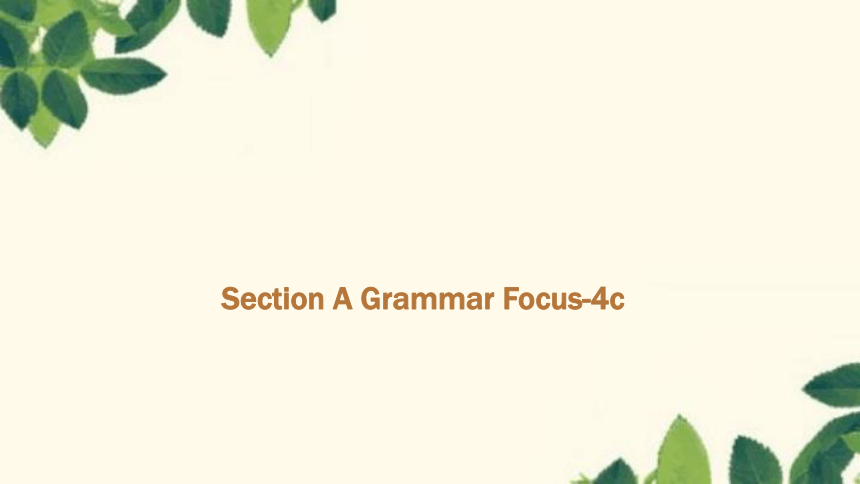 | |
| 格式 | ppt | ||
| 文件大小 | 2.0MB | ||
| 资源类型 | 教案 | ||
| 版本资源 | 人教新目标(Go for it)版 | ||
| 科目 | 英语 | ||
| 更新时间 | 2022-09-26 13:49:23 | ||
图片预览

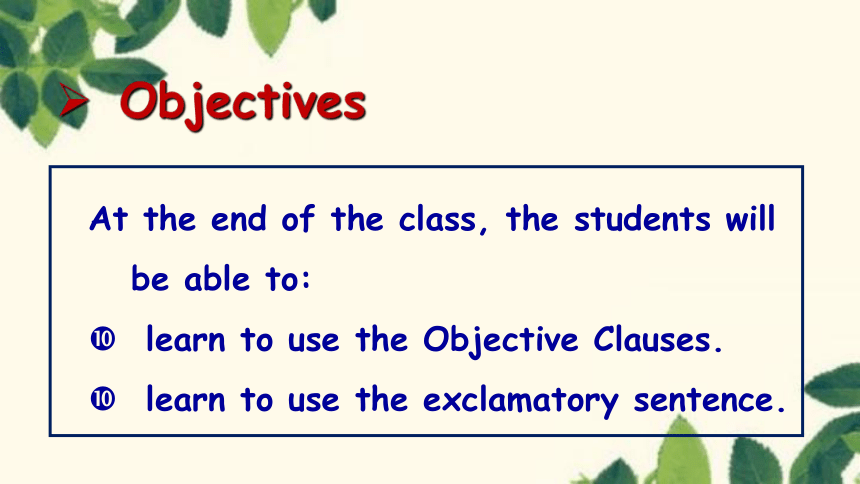
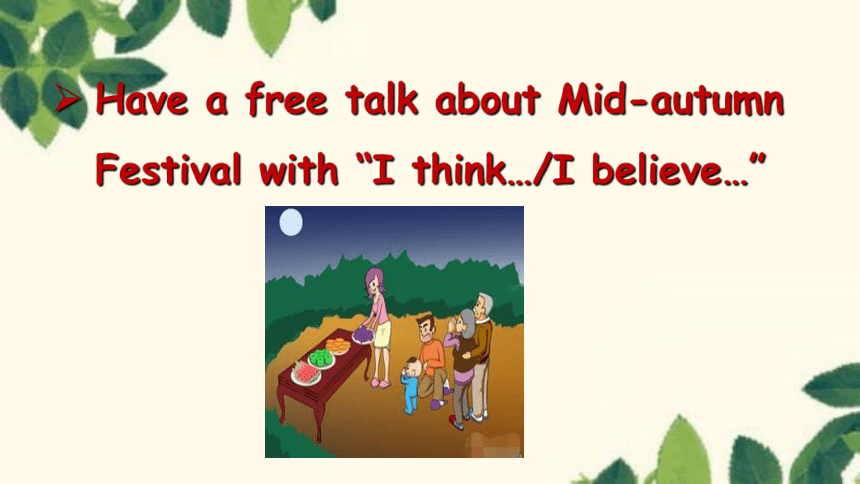
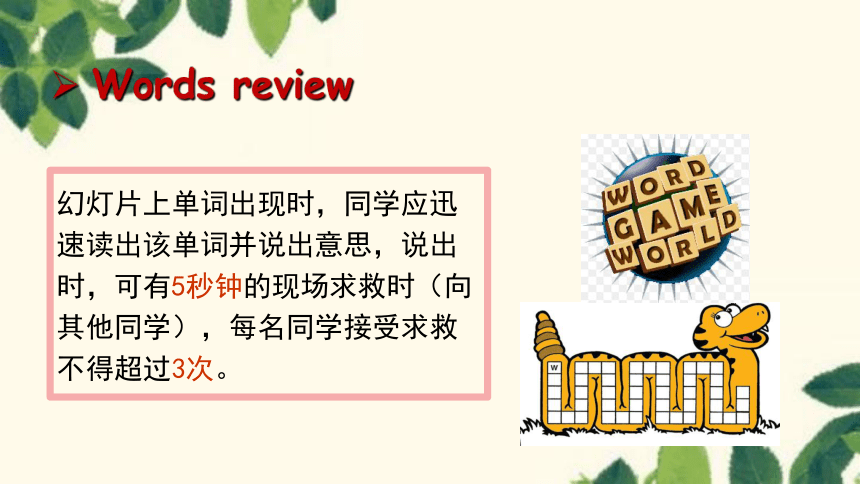
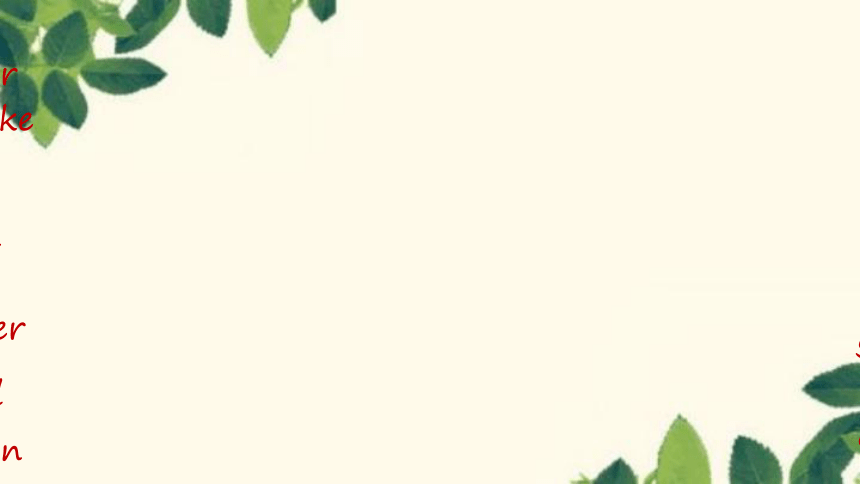
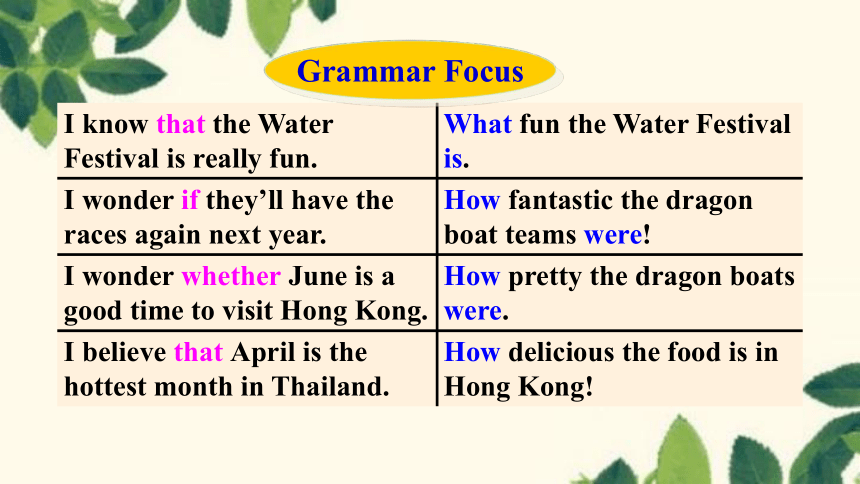
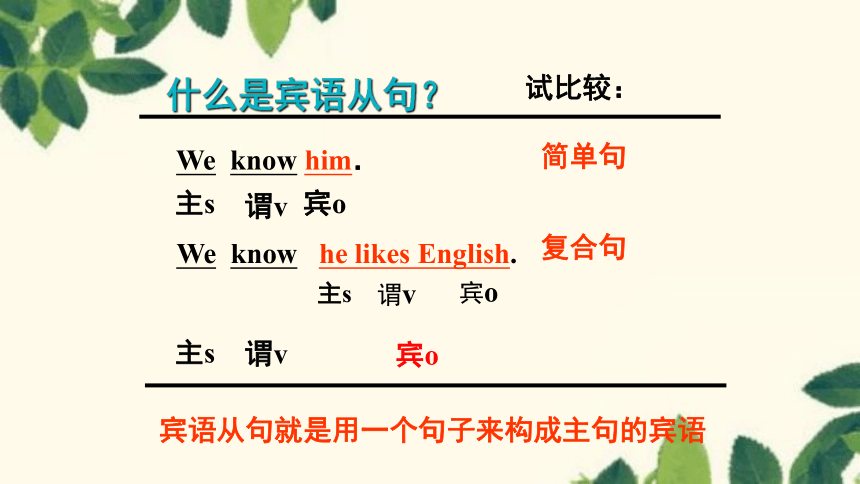
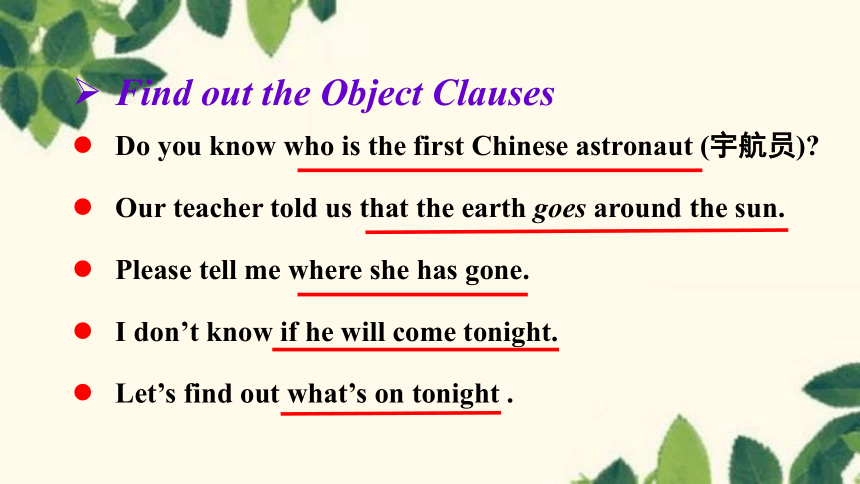
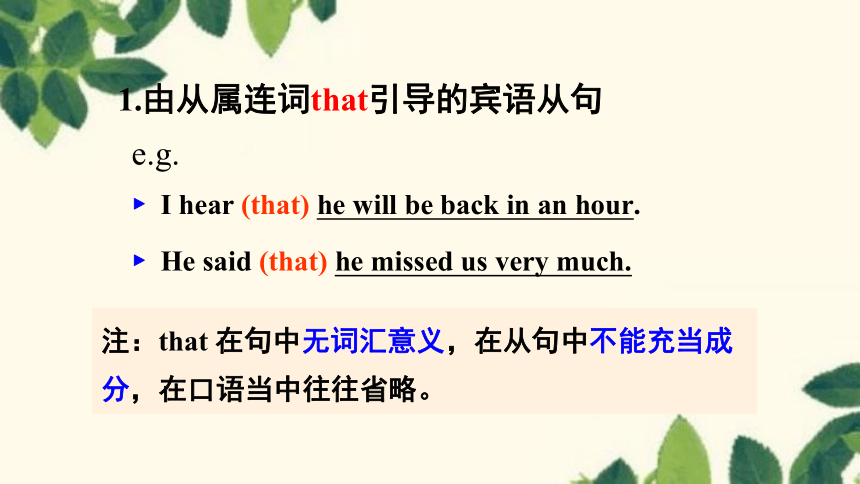
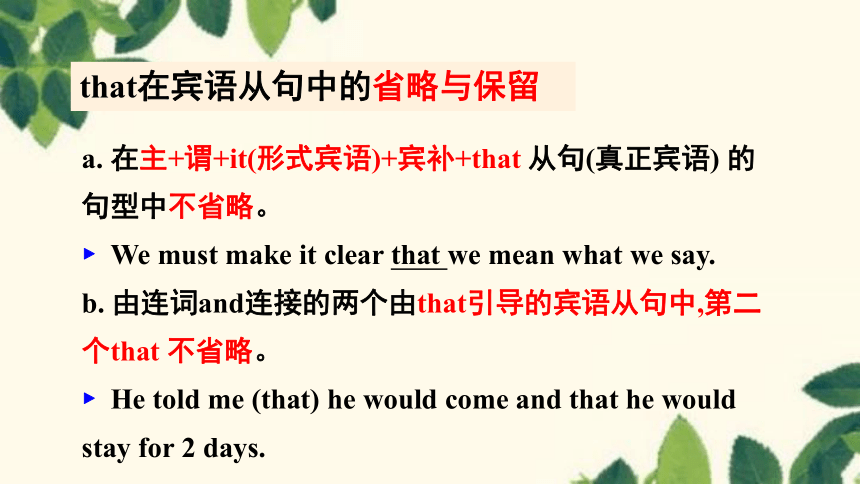
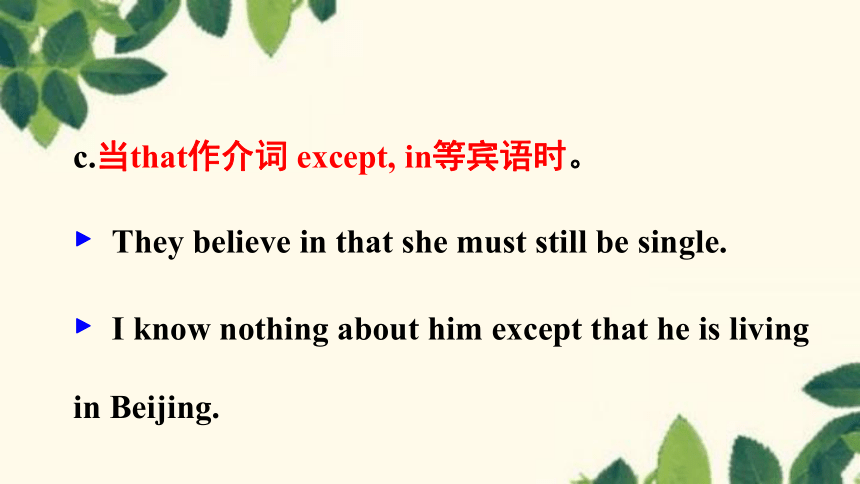
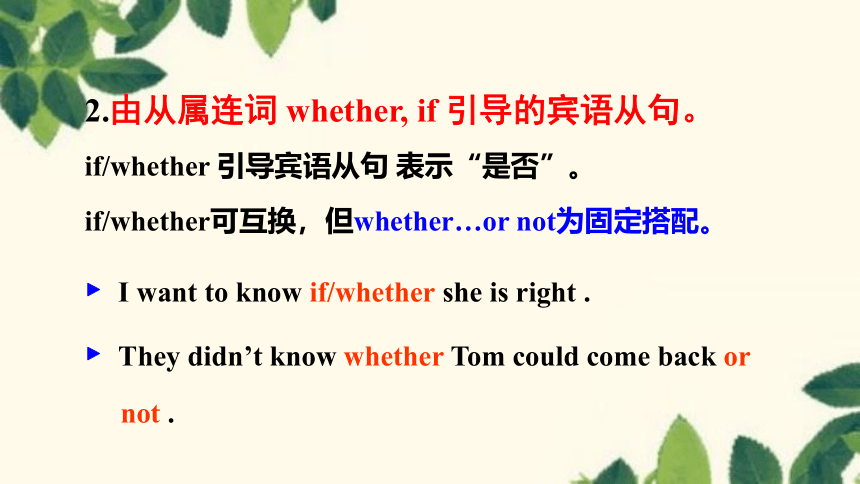
文档简介
(共69张PPT)
Section A Grammar Focus-4c
At the end of the class, the students will be able to:
learn to use the Objective Clauses.
learn to use the exclamatory sentence.
Objectives
Have a free talk about Mid-autumn Festival with “I think…/I believe…”
Words review
幻灯片上单词出现时,同学应迅速读出该单词并说出意思,说出时,可有5秒钟的现场求救时(向其他同学),每名同学接受求救不得超过3次。
mooncake
lantern
stranger
relative
put on
pound
steal
lay out
lay
dessert
garden
admire
whoever
goddess
folk
tradition
I know that the Water Festival is really fun. What fun the Water Festival is.
I wonder if they’ll have the races again next year. How fantastic the dragon boat teams were!
I wonder whether June is a good time to visit Hong Kong. How pretty the dragon boats were.
I believe that April is the hottest month in Thailand. How delicious the food is in Hong Kong!
Grammar Focus
试比较:
We know him.
We know he likes English.
主s
主s
谓v
谓v
宾o
宾o
宾语从句就是用一个句子来构成主句的宾语
主s
谓v
宾o
简单句
复合句
什么是宾语从句?
Do you know who is the first Chinese astronaut (宇航员)
Our teacher told us that the earth goes around the sun.
Please tell me where she has gone.
I don’t know if he will come tonight.
Let’s find out what’s on tonight .
Find out the Object Clauses
注:that 在句中无词汇意义,在从句中不能充当成分,在口语当中往往省略。
e.g.
I hear (that) he will be back in an hour.
He said (that) he missed us very much.
1.由从属连词that引导的宾语从句
a. 在主+谓+it(形式宾语)+宾补+that 从句(真正宾语) 的句型中不省略。
We must make it clear that we mean what we say.
b. 由连词and连接的两个由that引导的宾语从句中,第二个that 不省略。
He told me (that) he would come and that he would stay for 2 days.
that在宾语从句中的省略与保留
c.当that作介词 except, in等宾语时。
They believe in that she must still be single.
I know nothing about him except that he is living in Beijing.
2.由从属连词 whether, if 引导的宾语从句。
I want to know if/whether she is right .
They didn’t know whether Tom could come back or
not .
if/whether 引导宾语从句 表示“是否”。
if/whether可互换,但whether…or not为固定搭配。
1).whether和if都可以引导宾语从句
I don’t know whether or not he will come.
如果or not放在whether所引导的从句句尾,可用if 替换。
I don’t know whether/if he will come or not.
I worry about whether I hurt her feeling.
注意whether和if的使用区别
a.当whether后紧跟or not时,不用if.
b.介词后面的宾语从句不能用if.
He asked me whether I wanted to go there by train or
by bus.他问我是想乘火车还是坐公共汽车去那里。
whether...or还有“不管”之意,引导让步状语从句。
Whether he drives or takes the train, he will be here on time. 不管开车来还是乘火车来,他都会准时到。
c.在强调任意选择时,用whether…or,此时不用 if 替换whether。
He asked me whether I’d move to New York if I got
the job.
d. 虽引导宾语从句,但为了强调宾语部分,也可把从句放在句首,此时只用whether不用if。
Whether he will come I am not sure.
e.句子中有if 引导的条件句,如再有表示“是否”的宾语从句,用whether不用if。
Please let me know if you need help.
如果你需要帮助请告诉我。
或:请告诉我你是否需要帮助。对比:
Please let me know whether you need help.
请告诉我你是否需要帮助。
f. 容易产生歧义时用whether不用if来表示“是否”。
I don’t know if it won't rain tomorrow.
我不知道明天是不是会下雨。
g. 如果宾语从句为否定句时,则只用if不用
whether。
2).引导主语从句置于句首时,只能用whether。
Whether he comes or not makes no difference.
3). Whether可以引导表语从句和同位语从句,if不可以。
4).用在动词不定式之前时用whether不用if。
I don’t know whether to go there at once.
我不知道是不是该立刻去那里。
3.由连接代词 who, whom, whose, which, what 和连接副词 where, how, why, when引导的宾语从句
Do you know whose book it is
Please tell me when we’ll have a meeting .
Could you tell me why the train is late
He asked who could answer the question.
当主句是一般现在时,宾语从句的时态不作限制,我们可以根据句子的意思来使用需要的任何一种时态。
I hear (that)
Jim went to work an hour ago.
he is interested in English.
she will come tomorrow.
Tom has been to London twice.
宾语从句中时态的变化
He will go to Hong Kong .
He is sick.
He is reading a book .
He has finished his work.
He said
He had finished his work.
He would go to Hong Kong .
He was sick.
He was reading a book .
当主句是一般过去时的时候,宾语从句必须运用相应的过去的某一种时态,从而达到主句和从句的相互一致。
the sun is much bigger than the moon .
summer is after spring .
the earth moves around the sun.
He told me (that)
We kmew (that)
The teacher told us (that)
当宾语从句说明的是客观存在的事实或者是客观存在的真理时,就不用受到主句时态的限制,仍是用一般现在时态。
主句时态 从句时态
一般现在时、一般将来时、祈使句时 根据句意的需要用任意一种时态
一般过去时 与原句相对应的过去的时态
客观事实、真理、自然现象、名言警句、谚语等 一律用一般现在时
Danny says that he will learn English.
Do you know where he came from
Please tell me how I can get to the bus station .
无论主句是陈述句还是疑问句,宾语从句都是运用陈述句的语序,即是“主语在前,谓语在后”的顺序。
宾语从句的语序
宾语从句三要素
引导词
that+陈述句
if/whether+一般疑问句
特殊疑问词+特殊疑问句
时态
主句为一般现在时
主句为一般过去时
一般过去时
过去将来时
过去进行时
过去完成时
语序
宾语从句的语序都为陈述句语序
从句客观真理时态不变
从句可为任何时态
学习宾从三注意,时态语序和连词。
时态主从要呼应:
主句若为现在时,从句时态随句意;
主句若为过去时,从句时态变过去;
宾从若是表真理,时态不变无质疑。
语序要用陈述序,切莫照搬疑问句。
That 连接陈述句,省与不省要注意。
从句若表“是否”时,if/whether要慎记。
特殊问句作宾语,仍用原来疑问词。
三个问题需牢记,切莫丢东忘了西。
宾
语
从
句
歌
所谓感叹句,就是用来表达喜怒哀乐等强烈情感的句子。近年来,感叹句的构成及转换是中考常考的考点之一。
感叹句一般由“what”和“how”来开头的句子 “what”修饰名词,“how”修饰形容词和副词。
What 和 How引导的感叹句
What 引导的感叹句
“what”意为“多么”用作定语,修饰名词(被强调部分),名词前可有其它定语成份(即:形容词或冠词)。单数可数名词前要加不定冠词a/an,复数可数名词或不可数名词前不用冠词。
一般有三种形式,此时what为形容词,作定语,用来
修饰它后面的名词或词组。
1. what+a/an+形容词+可数名词单数+主语+谓语!
What an interesting story it is! 多么有趣的故事呀!
What a good girl she is! 她是个多么好的一个女孩啊!
2. what+形容词+不可数名词+主语+谓语!
What heavy snow it is! 多么大的雪呀!
What bad weather it is! 多么糟糕的天气!
3. what+形容词+可数名词复数+主语+谓语!
What beautiful flowers they are! 多么漂亮的花啊!
What good students they are! 他们是多么好的学生啊!
“how”意为“多么”,用作状语,修饰形容词或副词(被强调部分)。如果修饰形容词,则句中的谓语动词用系动词;如果how修饰副词,则句中的谓语动词用行为动词。
How 引导的感叹句
有三种结构形式。此时how是副词,用来修饰其的形容词 或副词,也可以修饰动词。
1. How+形容词+主语+谓语!例如:
How cold it is today! 今天多么冷呀!
How hot it is today! 今天多么热呀!
2. How+副词+主语+谓语! 例如:
How happy they look! 他们显得多么高兴呀!
How fast he runs! 他跑得多么快呀!
3. How+主语+谓语(陈述句)!例如:
How he loves his son!他是多么的爱他的儿子!
How time flies! 光阴似箭!
what修饰名词
What +名词+陈述语序
What+a/an+形容词+名词+ 陈述语序
What+ 形容词+复数名词+ 陈述语序
What+ 形容词+不可数名词+ 陈述语序
how 修饰形容词,副词或动词:
How +形容词+ a/an +名词+ 陈述语序
How+形容词或副词+ 陈述语序
How VS What
1. think / Lantern Festival / beautiful
I think that the Lantern Festival is beautiful.
2. don’t know / whether / he / come home / for the festival
_____________________________________
_____________________________________
3. believe / Water Festival / most / fun
___________________________________________
4a Write sentences using the words given.
I don’t know whether he will come
home for the festival.
I believe that the Water Festival is the most fun.
4. wonder / if / mooncakes / delicious
_____________________________________________
5. how / exciting / races
____________________________________
6. what / interesting / city
______________________________________
Jenny wonders if the mooncakes are delicious.
How exciting the races are!
What an interesting city ( it is)!
4b Read the passage below and underline the objective
clauses. If possible write your own sentences about
Mother’s Day and Father’s Day using objective clauses.
Dear Xia Yu,
Do you know that there are two special days for parents in America One is Mother’s Day on the second Sunday of May, and the other is Father’s Day on the third Sunday of June. On these two days, American children often give gifts to their parents or take them out for lunch or dinner.
Common gifts are flowers and cards for mothers and shirts or ties for fathers. I heard that it is becoming more and more popular to celebrate Mother’s Day and Father’s Day in China. I wonder if children over there also give similar gifts to their parents. I believe that there are many ways to show our love. Actually, we don’t have to spend a lot of money. It is also a good idea to help parents to do something instead.
June
4c Which festival do you like best
Ask your group and report to the class.
e.g. In our group, David’s favorite festival is ... He thinks that …
In our group, David’s favorite festival is Halloween. He thinks that on that day children will wear special costumes with mask to take part in Halloween party. And play “trick or treat”.
Sample:
Ⅰ. 用正确的形式填空。
1. The radio says it __________cloudy tomorrow. (be)
2. The headmaster hopes everything ________well. (go)
3. Tom says that they_____________ (play) basketball at
six o’clock yesterday evening.
4. I hear they ________________(return) it already.
Exercises
will be
goes
were playing
have returned
5. He said that they___________members of the Party since 1948. (be)
6. He asked what they___________ at eight last night. (do)
7. The teacher told his class that light________ faster than sound. (travel)
8. I think you ___________ about the relay race now. (talk)
9. I didn’t know whom the letters________from. (be)
have been
were doing
travels
are talking
were
Ⅱ. 单选。
1. _____ food you've cooked!
A. How a nice B. What a nice
C. How nice D. What nice
2. _____terrible weather we've been having these days!
A. What B. What a C. How D. How a
3.—With the help of doctors, the boy can see again.
—_____he is!
A. What luckly B. What a luck
C. How lucky D. How a luck
A
D
C
Ⅲ. 根据汉语提示,完成句子。
1. He says________________________________________.
(他说他爸爸三天后回来)
2. Our teacher asks___________________________________.
(昨天谁打碎了玻璃)
3. Please tell me_____________________________.
(他们正在谈论什么)
that his father will be back in three days
who broke the window yesterday
what they are talking about
— Linda, could you remember_______
— Have you forgotten we agreed to go to Hongkong
A. where are we going after exam
B. where we are going after the exam
C. where are we going to after the exam
D. where we are going to after the exam
B
中考链接
你记得考试后我们要去哪里吗?宾语从句要用陈述句语序。
去香港。可知上句问去哪。
— I don’t know tomorrow.
— You can ask our teacher right now.
A. if we take the bus there
B. when will we leave
C. what will we do
D. how we will go there
D
tomorrow明天,
可知用将来时
I don’t know后面跟宾语从句,从句要用陈述句语序。
Homework
Practice more exercises to master
the grammar learnt in this part.
To listen to 1c and 1d, then complete them.
To learn new words: pronounce, increase, speed, partner…
Objectives
Do you have difficulties in learning English
What things are difficult for you
Discussion
What’s your problem in learning English How do you solve them
I have difficulties in
learning English.
Can you help me
The difficulties he has in learning English.
New words: can’t pronounce some of the words
spell some English words
Speaking: be afraid to speak
Listening: can’t understand spoken English
Writing: can’t make complete sentences
Reading: read very slowly
Grammar: make mistakes
1a Learning English can be difficult. What things are
difficult for you Read the list. Check ( ) the
statements that are true for you.
____ I can’t pronounce some of the words.(v. 发音)
____ I can’t always understand spoken English.
____ I don’t know how to increase my reading speed.
____ I can’t spell some English words.
____ I often make mistakes in grammar.
(v. 增加;增长)
(n. 速度)
1b What other things are difficult for you
Make a list.
1. I don’t know enough words to write well.
2. ________________________________
3. ________________________________
4. ______________________________
5. ________________________________
can’t get the pronunciation right
be afraid people might laugh at me
forget a lot of new words
don’t get much writing practice
1c Paul finds it difficult to learn English. Listen and
complete the learning challenges he talks about.
1. He can’t get the__________________ right.
2. He___________ a lot of new words.
3. He can’t always_____________ when people talk to him.
4. He doesn’t get much___________ practice.
pronunciation
forgets
understand
writing
Challenges
1d Listen again. Complete the solutions.
1. ________________ can help.
He can always_____________________ in his notebook and study them at home.
He can_____________________________ to practice speaking.
He should find a _______ to practice writing.
Listening
write the new words
join an English language club
pen pal
Solutions
1e Role-play conversations using the information
in 1c and 1d.
① A: I don’t have a partner to practice English with.
B: Maybe you should join an English club.
② A: I always forget the new words.
B: You can write the new words in your notebook
and study them at home.
A: I can’t always understand when people talk to me.
B: Maybe you should join an English language club
to practice speaking.
A: I forget a lot of new words.
B: Maybe you should write the new words in your
notebook and study them at home.
Pair work
1.I often make mistakes in grammar.
mistake n. 错误;过失 make mistakes 犯错
Tom didn’t make a single spelling mistake in his composition. 汤姆在这篇作文里一个字也没拼错。
mistake vt. 弄错,误解
I mistook the number and went to the wrong room. 我记错号码, 走错了房间。
Language points
2. challenge n. 挑战
He wants a career that offers a challenge. 他想要一份有挑战性的事业。
vt. 向……挑战;对……提出异议
I challenged him to show his proof. 我要他拿出证据。
He challenged my view on that matter. 他就我对那件事的看法提出异议。
3. solution n. (问题、疑难等的) 解决;解答
It may take a long time to find a solution to the problem. 也许要花很长时间才能找到解决这个问题的办法。 The solution of the problem requires a lot of time. 解决这个问题需要很多时间。
4. Maybe you should join an English club.
join/join in/take part in
(1) join=be a member of 参加, 指加入某种组织,并成为其中的一员。
join the army / party 入伍/党 join the club 加入俱乐部
join in 后接活动名称
join sb. 加入到某个人群之中
Ⅰ. 用所给词的适当形式填空。
1. Sometimes, I can’t get the____________ (pronounce) right.
2. I don’t know how__________ (improve) my spoken English.
3. The more careful you are, the fewer_________ (mistake)
you’ll make.
4. You can find a pen pal to practice________ (write).
5. She can’t______ (spell) English words.
Exercises
pronunciation
to improve
mistakes
writing
spell
Ⅱ. 用方框中所给单词的适当形式填空。
We must learn to face the __________ in our life.
2. He has trouble in understanding _______ English.
3. Can you think of a good _______ to the problem
4. You can listen to the tapes to get much listening _______.
5. The more careful you are, the fewer _______ you’ll make.
solution, practice, mistake, spoken, challenges
challenges
spoken
solution
practice
mistakes
— Excuse me, can you teach me how to ______
this new word
— No problem. Look at my mouth and listen
carefully.
A. prove B. pronounce
C. prepare D. produce
B
中考链接
证明
准备
发音
生产
你能教给我这个新词怎么样……
— Miss Huang always advises us to practice
speaking English after class.
— She is right. Speaking is an important
language __________.
A. sign B. skill C. suggestion
符号
技能
建议
B
Review the new words and expressions you’ve learned today.
Preview the article How Can You Become a Successful Learner on page 6.
Homework
Section A Grammar Focus-4c
At the end of the class, the students will be able to:
learn to use the Objective Clauses.
learn to use the exclamatory sentence.
Objectives
Have a free talk about Mid-autumn Festival with “I think…/I believe…”
Words review
幻灯片上单词出现时,同学应迅速读出该单词并说出意思,说出时,可有5秒钟的现场求救时(向其他同学),每名同学接受求救不得超过3次。
mooncake
lantern
stranger
relative
put on
pound
steal
lay out
lay
dessert
garden
admire
whoever
goddess
folk
tradition
I know that the Water Festival is really fun. What fun the Water Festival is.
I wonder if they’ll have the races again next year. How fantastic the dragon boat teams were!
I wonder whether June is a good time to visit Hong Kong. How pretty the dragon boats were.
I believe that April is the hottest month in Thailand. How delicious the food is in Hong Kong!
Grammar Focus
试比较:
We know him.
We know he likes English.
主s
主s
谓v
谓v
宾o
宾o
宾语从句就是用一个句子来构成主句的宾语
主s
谓v
宾o
简单句
复合句
什么是宾语从句?
Do you know who is the first Chinese astronaut (宇航员)
Our teacher told us that the earth goes around the sun.
Please tell me where she has gone.
I don’t know if he will come tonight.
Let’s find out what’s on tonight .
Find out the Object Clauses
注:that 在句中无词汇意义,在从句中不能充当成分,在口语当中往往省略。
e.g.
I hear (that) he will be back in an hour.
He said (that) he missed us very much.
1.由从属连词that引导的宾语从句
a. 在主+谓+it(形式宾语)+宾补+that 从句(真正宾语) 的句型中不省略。
We must make it clear that we mean what we say.
b. 由连词and连接的两个由that引导的宾语从句中,第二个that 不省略。
He told me (that) he would come and that he would stay for 2 days.
that在宾语从句中的省略与保留
c.当that作介词 except, in等宾语时。
They believe in that she must still be single.
I know nothing about him except that he is living in Beijing.
2.由从属连词 whether, if 引导的宾语从句。
I want to know if/whether she is right .
They didn’t know whether Tom could come back or
not .
if/whether 引导宾语从句 表示“是否”。
if/whether可互换,但whether…or not为固定搭配。
1).whether和if都可以引导宾语从句
I don’t know whether or not he will come.
如果or not放在whether所引导的从句句尾,可用if 替换。
I don’t know whether/if he will come or not.
I worry about whether I hurt her feeling.
注意whether和if的使用区别
a.当whether后紧跟or not时,不用if.
b.介词后面的宾语从句不能用if.
He asked me whether I wanted to go there by train or
by bus.他问我是想乘火车还是坐公共汽车去那里。
whether...or还有“不管”之意,引导让步状语从句。
Whether he drives or takes the train, he will be here on time. 不管开车来还是乘火车来,他都会准时到。
c.在强调任意选择时,用whether…or,此时不用 if 替换whether。
He asked me whether I’d move to New York if I got
the job.
d. 虽引导宾语从句,但为了强调宾语部分,也可把从句放在句首,此时只用whether不用if。
Whether he will come I am not sure.
e.句子中有if 引导的条件句,如再有表示“是否”的宾语从句,用whether不用if。
Please let me know if you need help.
如果你需要帮助请告诉我。
或:请告诉我你是否需要帮助。对比:
Please let me know whether you need help.
请告诉我你是否需要帮助。
f. 容易产生歧义时用whether不用if来表示“是否”。
I don’t know if it won't rain tomorrow.
我不知道明天是不是会下雨。
g. 如果宾语从句为否定句时,则只用if不用
whether。
2).引导主语从句置于句首时,只能用whether。
Whether he comes or not makes no difference.
3). Whether可以引导表语从句和同位语从句,if不可以。
4).用在动词不定式之前时用whether不用if。
I don’t know whether to go there at once.
我不知道是不是该立刻去那里。
3.由连接代词 who, whom, whose, which, what 和连接副词 where, how, why, when引导的宾语从句
Do you know whose book it is
Please tell me when we’ll have a meeting .
Could you tell me why the train is late
He asked who could answer the question.
当主句是一般现在时,宾语从句的时态不作限制,我们可以根据句子的意思来使用需要的任何一种时态。
I hear (that)
Jim went to work an hour ago.
he is interested in English.
she will come tomorrow.
Tom has been to London twice.
宾语从句中时态的变化
He will go to Hong Kong .
He is sick.
He is reading a book .
He has finished his work.
He said
He had finished his work.
He would go to Hong Kong .
He was sick.
He was reading a book .
当主句是一般过去时的时候,宾语从句必须运用相应的过去的某一种时态,从而达到主句和从句的相互一致。
the sun is much bigger than the moon .
summer is after spring .
the earth moves around the sun.
He told me (that)
We kmew (that)
The teacher told us (that)
当宾语从句说明的是客观存在的事实或者是客观存在的真理时,就不用受到主句时态的限制,仍是用一般现在时态。
主句时态 从句时态
一般现在时、一般将来时、祈使句时 根据句意的需要用任意一种时态
一般过去时 与原句相对应的过去的时态
客观事实、真理、自然现象、名言警句、谚语等 一律用一般现在时
Danny says that he will learn English.
Do you know where he came from
Please tell me how I can get to the bus station .
无论主句是陈述句还是疑问句,宾语从句都是运用陈述句的语序,即是“主语在前,谓语在后”的顺序。
宾语从句的语序
宾语从句三要素
引导词
that+陈述句
if/whether+一般疑问句
特殊疑问词+特殊疑问句
时态
主句为一般现在时
主句为一般过去时
一般过去时
过去将来时
过去进行时
过去完成时
语序
宾语从句的语序都为陈述句语序
从句客观真理时态不变
从句可为任何时态
学习宾从三注意,时态语序和连词。
时态主从要呼应:
主句若为现在时,从句时态随句意;
主句若为过去时,从句时态变过去;
宾从若是表真理,时态不变无质疑。
语序要用陈述序,切莫照搬疑问句。
That 连接陈述句,省与不省要注意。
从句若表“是否”时,if/whether要慎记。
特殊问句作宾语,仍用原来疑问词。
三个问题需牢记,切莫丢东忘了西。
宾
语
从
句
歌
所谓感叹句,就是用来表达喜怒哀乐等强烈情感的句子。近年来,感叹句的构成及转换是中考常考的考点之一。
感叹句一般由“what”和“how”来开头的句子 “what”修饰名词,“how”修饰形容词和副词。
What 和 How引导的感叹句
What 引导的感叹句
“what”意为“多么”用作定语,修饰名词(被强调部分),名词前可有其它定语成份(即:形容词或冠词)。单数可数名词前要加不定冠词a/an,复数可数名词或不可数名词前不用冠词。
一般有三种形式,此时what为形容词,作定语,用来
修饰它后面的名词或词组。
1. what+a/an+形容词+可数名词单数+主语+谓语!
What an interesting story it is! 多么有趣的故事呀!
What a good girl she is! 她是个多么好的一个女孩啊!
2. what+形容词+不可数名词+主语+谓语!
What heavy snow it is! 多么大的雪呀!
What bad weather it is! 多么糟糕的天气!
3. what+形容词+可数名词复数+主语+谓语!
What beautiful flowers they are! 多么漂亮的花啊!
What good students they are! 他们是多么好的学生啊!
“how”意为“多么”,用作状语,修饰形容词或副词(被强调部分)。如果修饰形容词,则句中的谓语动词用系动词;如果how修饰副词,则句中的谓语动词用行为动词。
How 引导的感叹句
有三种结构形式。此时how是副词,用来修饰其的形容词 或副词,也可以修饰动词。
1. How+形容词+主语+谓语!例如:
How cold it is today! 今天多么冷呀!
How hot it is today! 今天多么热呀!
2. How+副词+主语+谓语! 例如:
How happy they look! 他们显得多么高兴呀!
How fast he runs! 他跑得多么快呀!
3. How+主语+谓语(陈述句)!例如:
How he loves his son!他是多么的爱他的儿子!
How time flies! 光阴似箭!
what修饰名词
What +名词+陈述语序
What+a/an+形容词+名词+ 陈述语序
What+ 形容词+复数名词+ 陈述语序
What+ 形容词+不可数名词+ 陈述语序
how 修饰形容词,副词或动词:
How +形容词+ a/an +名词+ 陈述语序
How+形容词或副词+ 陈述语序
How VS What
1. think / Lantern Festival / beautiful
I think that the Lantern Festival is beautiful.
2. don’t know / whether / he / come home / for the festival
_____________________________________
_____________________________________
3. believe / Water Festival / most / fun
___________________________________________
4a Write sentences using the words given.
I don’t know whether he will come
home for the festival.
I believe that the Water Festival is the most fun.
4. wonder / if / mooncakes / delicious
_____________________________________________
5. how / exciting / races
____________________________________
6. what / interesting / city
______________________________________
Jenny wonders if the mooncakes are delicious.
How exciting the races are!
What an interesting city ( it is)!
4b Read the passage below and underline the objective
clauses. If possible write your own sentences about
Mother’s Day and Father’s Day using objective clauses.
Dear Xia Yu,
Do you know that there are two special days for parents in America One is Mother’s Day on the second Sunday of May, and the other is Father’s Day on the third Sunday of June. On these two days, American children often give gifts to their parents or take them out for lunch or dinner.
Common gifts are flowers and cards for mothers and shirts or ties for fathers. I heard that it is becoming more and more popular to celebrate Mother’s Day and Father’s Day in China. I wonder if children over there also give similar gifts to their parents. I believe that there are many ways to show our love. Actually, we don’t have to spend a lot of money. It is also a good idea to help parents to do something instead.
June
4c Which festival do you like best
Ask your group and report to the class.
e.g. In our group, David’s favorite festival is ... He thinks that …
In our group, David’s favorite festival is Halloween. He thinks that on that day children will wear special costumes with mask to take part in Halloween party. And play “trick or treat”.
Sample:
Ⅰ. 用正确的形式填空。
1. The radio says it __________cloudy tomorrow. (be)
2. The headmaster hopes everything ________well. (go)
3. Tom says that they_____________ (play) basketball at
six o’clock yesterday evening.
4. I hear they ________________(return) it already.
Exercises
will be
goes
were playing
have returned
5. He said that they___________members of the Party since 1948. (be)
6. He asked what they___________ at eight last night. (do)
7. The teacher told his class that light________ faster than sound. (travel)
8. I think you ___________ about the relay race now. (talk)
9. I didn’t know whom the letters________from. (be)
have been
were doing
travels
are talking
were
Ⅱ. 单选。
1. _____ food you've cooked!
A. How a nice B. What a nice
C. How nice D. What nice
2. _____terrible weather we've been having these days!
A. What B. What a C. How D. How a
3.—With the help of doctors, the boy can see again.
—_____he is!
A. What luckly B. What a luck
C. How lucky D. How a luck
A
D
C
Ⅲ. 根据汉语提示,完成句子。
1. He says________________________________________.
(他说他爸爸三天后回来)
2. Our teacher asks___________________________________.
(昨天谁打碎了玻璃)
3. Please tell me_____________________________.
(他们正在谈论什么)
that his father will be back in three days
who broke the window yesterday
what they are talking about
— Linda, could you remember_______
— Have you forgotten we agreed to go to Hongkong
A. where are we going after exam
B. where we are going after the exam
C. where are we going to after the exam
D. where we are going to after the exam
B
中考链接
你记得考试后我们要去哪里吗?宾语从句要用陈述句语序。
去香港。可知上句问去哪。
— I don’t know tomorrow.
— You can ask our teacher right now.
A. if we take the bus there
B. when will we leave
C. what will we do
D. how we will go there
D
tomorrow明天,
可知用将来时
I don’t know后面跟宾语从句,从句要用陈述句语序。
Homework
Practice more exercises to master
the grammar learnt in this part.
To listen to 1c and 1d, then complete them.
To learn new words: pronounce, increase, speed, partner…
Objectives
Do you have difficulties in learning English
What things are difficult for you
Discussion
What’s your problem in learning English How do you solve them
I have difficulties in
learning English.
Can you help me
The difficulties he has in learning English.
New words: can’t pronounce some of the words
spell some English words
Speaking: be afraid to speak
Listening: can’t understand spoken English
Writing: can’t make complete sentences
Reading: read very slowly
Grammar: make mistakes
1a Learning English can be difficult. What things are
difficult for you Read the list. Check ( ) the
statements that are true for you.
____ I can’t pronounce some of the words.(v. 发音)
____ I can’t always understand spoken English.
____ I don’t know how to increase my reading speed.
____ I can’t spell some English words.
____ I often make mistakes in grammar.
(v. 增加;增长)
(n. 速度)
1b What other things are difficult for you
Make a list.
1. I don’t know enough words to write well.
2. ________________________________
3. ________________________________
4. ______________________________
5. ________________________________
can’t get the pronunciation right
be afraid people might laugh at me
forget a lot of new words
don’t get much writing practice
1c Paul finds it difficult to learn English. Listen and
complete the learning challenges he talks about.
1. He can’t get the__________________ right.
2. He___________ a lot of new words.
3. He can’t always_____________ when people talk to him.
4. He doesn’t get much___________ practice.
pronunciation
forgets
understand
writing
Challenges
1d Listen again. Complete the solutions.
1. ________________ can help.
He can always_____________________ in his notebook and study them at home.
He can_____________________________ to practice speaking.
He should find a _______ to practice writing.
Listening
write the new words
join an English language club
pen pal
Solutions
1e Role-play conversations using the information
in 1c and 1d.
① A: I don’t have a partner to practice English with.
B: Maybe you should join an English club.
② A: I always forget the new words.
B: You can write the new words in your notebook
and study them at home.
A: I can’t always understand when people talk to me.
B: Maybe you should join an English language club
to practice speaking.
A: I forget a lot of new words.
B: Maybe you should write the new words in your
notebook and study them at home.
Pair work
1.I often make mistakes in grammar.
mistake n. 错误;过失 make mistakes 犯错
Tom didn’t make a single spelling mistake in his composition. 汤姆在这篇作文里一个字也没拼错。
mistake vt. 弄错,误解
I mistook the number and went to the wrong room. 我记错号码, 走错了房间。
Language points
2. challenge n. 挑战
He wants a career that offers a challenge. 他想要一份有挑战性的事业。
vt. 向……挑战;对……提出异议
I challenged him to show his proof. 我要他拿出证据。
He challenged my view on that matter. 他就我对那件事的看法提出异议。
3. solution n. (问题、疑难等的) 解决;解答
It may take a long time to find a solution to the problem. 也许要花很长时间才能找到解决这个问题的办法。 The solution of the problem requires a lot of time. 解决这个问题需要很多时间。
4. Maybe you should join an English club.
join/join in/take part in
(1) join=be a member of 参加, 指加入某种组织,并成为其中的一员。
join the army / party 入伍/党 join the club 加入俱乐部
join in 后接活动名称
join sb. 加入到某个人群之中
Ⅰ. 用所给词的适当形式填空。
1. Sometimes, I can’t get the____________ (pronounce) right.
2. I don’t know how__________ (improve) my spoken English.
3. The more careful you are, the fewer_________ (mistake)
you’ll make.
4. You can find a pen pal to practice________ (write).
5. She can’t______ (spell) English words.
Exercises
pronunciation
to improve
mistakes
writing
spell
Ⅱ. 用方框中所给单词的适当形式填空。
We must learn to face the __________ in our life.
2. He has trouble in understanding _______ English.
3. Can you think of a good _______ to the problem
4. You can listen to the tapes to get much listening _______.
5. The more careful you are, the fewer _______ you’ll make.
solution, practice, mistake, spoken, challenges
challenges
spoken
solution
practice
mistakes
— Excuse me, can you teach me how to ______
this new word
— No problem. Look at my mouth and listen
carefully.
A. prove B. pronounce
C. prepare D. produce
B
中考链接
证明
准备
发音
生产
你能教给我这个新词怎么样……
— Miss Huang always advises us to practice
speaking English after class.
— She is right. Speaking is an important
language __________.
A. sign B. skill C. suggestion
符号
技能
建议
B
Review the new words and expressions you’ve learned today.
Preview the article How Can You Become a Successful Learner on page 6.
Homework
同课章节目录
- Unit 1 How can we become good learners.
- Section A
- Section B
- Unit 2 I think that mooncakes are delicious!
- Section A
- Section B
- Unit 3 Could you please tell me where the restroom
- Section A
- Section B
- Unit 4 I used to be afraid of the dark.
- Section A
- Section B
- Unit 5 What are the shirts made of?
- Section A
- Section B
- Review of Units 1-5
- Unit 6 When was it invented?
- Section A
- Section B
- Unit 7 Teenagers should be allowed to choose their
- Section A
- Section B
- Unit 8 It must belong to Carla.
- Section A
- Section B
- Unit 9 I like music that I can dance to.
- Section A
- Section B
- Unit 10 You're supposed to shake hands.
- Section A
- Section B
- Review of Units 6-10
- Unit 11 Sad movies make me cry.
- Section A
- Section B
- Unit 12 Life is full of the unexpected
- Section A
- Section B
- Unit 13 We're trying to save the earth!
- Section A
- Section B
- Unit 14 I remember meeting all of you in Grade 7.
- Section A
- Section B
- Review of Units 11-14
